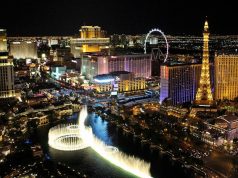While many people come to the desert for health reasons, thinking they will escape their seasonal allergies, after a year or two of living in Las Vegas, they find out that “allergy season” can be a year-round affair here in valley.
When is Allergy Season in Las Vegas and what Types of Pollen cause the most Problems?
Las Vegas allergy season can be summed up as a year-round discomfort followed by periodic spikes in pollen that make you feel like someone just shoved a hot poker into your eyeballs and made you snort multiple lines of wasabi!
Those spikes tend to come around February and seem to last until somewhere around November. Las Vegas actually has one of the highest spring pollen counts in the country, much of this comes from so-called desert landscaping that was introduced to the valley decades ago – the landscaping that causes the most problems are olive and mulberry trees.
Mulberry
Mulberry season starts as early as February; Mulberry is the #1 allergen in Las Vegas and seems to just hit you without warning a couple of months before spring.
European Olive
Once Mulberry starts kicking your ass, the next assault comes around March or April as the European olive tree starts spreading pollen throughout Las Vegas.
Cottonwood
You then get hit with Cottonwood sometime in between March through May.
But wait folks, there’s more!
We also have a ragweed season that kicks you right in the sack at least two times a year. Yep, Ragweed season happens here in Vegas in the spring and the fall. But don’t forget that because of our desert environment, we can even get things like ash trees blooming in January – it really is a year-round assault on your sinuses!
What Allergy Symptoms can you expect in Vegas?
Because of our dry desert air, allergy symptoms can be compounded and make you feel even worse than other areas of the country. In fact, some people even complain of feeling like they are hit with a mild cold for months on end. Here are some of the most common symptoms.
- Sneezing, Runny or stuffy nose, postnasal drainage, and sinus problems.
- Itchy, blurry, or watery eyes.
- Itchy nose, ears and ear congestion.
- Post-nasal drip (which can sometimes even cause a mild sore throat or pain in the roof of your mouth).
- Mild fatigue, similar to what you might experience with a cold virus.
What can you do to stop your allergy problems or at least get some relief?
As an allergy suffer, I’m not going to lie – you can do things to lessen the effects of our crazy pollen levels, but at some point you are going to be miserable as hell for a couple of months and there isn’t a lot you can do about it.
Allergists will tell you that to avoid pollen you should stay indoors; well no shit, but who the hell wants to lock themselves inside 24/7/365? Well, then again, we do have a populous of mask wearing sheep who haven’t left their homes in over a year because of a magic fairytale virus, but I guess that’s for another article.
Masks for Allergies?
But let’s talk about masks – Allergists new talking point is to tell everyone how Coronavirus may be a Godsend for allergy suffers, since the magic masks could help reduce their symptoms.
While we fucking hate this COVID mask bullshit, they may stop some pollen particles, since unlike Coronavirus, pollen particles are fairly large and even the crappy fabric masks can capture these larger pollen particles. Just make sure you wash the damn things after wearing them!
Window Shut, Air On!
When you are at home, we recommend keeping your windows shut and keeping the AC going. We also recommend changing out you air filters every 1-2 months – seriously, this may sound like overkill, but Vegas is a dusty, pollen filled mess that really screws with you if you don’t take these measures seriously.
Also don’t cheap out, buy filters that are rated for allergy defense like Filtrete AC Furnace Air Filters with Micro Allergen Defense.
Shower, Hats and Changing your Clothes!
You want to prevent as much pollen from entering your home as possible, so as a result you need to be careful when coming inside.
Extra showers when you come home, wearing a hat to keep pollen out of your hair, and removing your outside clothes when you get home can go a long way to keeping your house somewhat pollen-free.
Shoot your Cat!
Seriously, they are disgusting, useless creatures!
Alright, I guess you can’t shoot your cat, but if you have animals that go outside they can and will drag loads of pollen inside, so you need to do some serous thinking before you buy an animal in Las Vegas! If you do have a pet, keep it indoors when possible and give them regular baths to rinse away pollen.
Saline Spray: Use it!
One of the best things you can do to prevent pollen problems, is to keep your sinuses hydrated and clean. Vegas is dry as baked camel shit, and that only makes your sinus problems that much worse! Using even this cheap saline spray can work wonders on your symptoms!
Keep an Air Filter in every Room!
On top of vacuuming daily, another good way to reduce pollen in your home is to buy a good HEPA air filter for every room in your house.
What about Local Honey?
While most local doctors will tell you there is no “scientific” evidence that it works, in theory it should work similar to the thousands of dollars and years worth of allergy immunotherapy shots they are trying to sell — so, they do have a financial interest in shitting on holistic, natural approaches! Many people swear by it, so it’s a cheap option that really doesn’t do you any harm by trying it!
Natural and Alternative Medicines that Can Help
There are a number of natural products and alternative medicines that can reduce your allergy problems, if you take them routinely. Here are some that may help.
- Vitamin C: Nature’s Antihistamine? According to multiple studies, Vitamin C may reduce your body’s natural production of histamines. In 2018, researchers noted that high doses of vitamin C taken intravenously reduced allergic symptoms. They also found that a deficiency in vitamin C may exacerbate allergy-related issues as vitamin C is both a strong antioxidant and anti-inflammatory. Supporting studies from 2000 suggests taking 2g of vitamin C per day may help treat hay fever.
- Bromelain: Bromelain is an enzyme found in the core and juice of pineapples and is also available as a natural supplement. Bromelain is a popular natural remedy for inflammation, and can be useful for treating sinus inflammation.
- Quercetin: Quercetin has been shown in studies to be an effective natural antihistamine. Quercetin may help support normal, healthy sinuses and respiratory function.
- Get some damn sun! While allergy sufferers are often told to stay indoors and away from pollen, a number of studies suggest that Vitamin D deficiency may be related to allergic rhinitis. Besides sunlight, Vitamin D is found in fortified foods, Beef liver, fish, and egg yolks.
Daily Allergy Pills!
We live on Claritin and Zyrtec! Making sure you keep this at a baseline level inside of your system is important. And lots of people swear by alternating these two every couple of months. We have no idea why this works – we are not fucking doctors and before you go crying to Daddy Government, NONE OF THIS IS MEDICAL ADVICE! We just know it works, for those that say it works!
Also, don’t get any of that Decongestant crap if you like to drink – again, we are not doctors but we heard they do not mix well!






